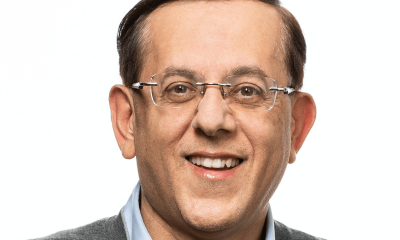Technology
How to win a global meditation contest, two years in a row

A budding sports tournament needs a good storyline. And one character in a good sports story is an overdog — a dominant force that the rest of the sport can measure itself against, the one to beat. Think of the Green Bay Packers in the first few Super Bowls, or the Minneapolis Lakers in the 1950s NBA, or Uruguay and Italy in the early World Cups.
And now the world of competitive meditation has its overdog. A machine of a meditator who continually amazes opponents with his unflappable calm and perfect games. Not only has he won his second March Mindfulness tournament in a row, against opponents from around the world, but he has done so despite my best efforts to mess him up by changing the entire format of the contest.
Before we get into this overdog’s identity, let me back up and explain the history. I created March Mindfulness in 2018. It was a March Madness-style bracket tournament where players used the Muse headset, which measures brain activity. The more calm and focused your mind, the more birds you hear in the Muse app. Players went head to head, literally, and the ones with the most birds won.
It was both silly and serious; a recruitment tool for the benefits of meditation as well as a commentary on how we use wearables. After all, Muse encourages you to post your score to social media. This was just a more overt form of competition.
In the years since, I pushed March Mindfulness in new directions. In 2019 we had a Survivor-style showdown between gamers and meditators. The gamers won by being more playful, experimenting to find the quietest parts of their brains and sticking their attention there. (Top meditators tended to be crushed in later rounds by the pressure of expectations.) In 2020, with the help of Muse, I planned a tournament in front of a live audience — until COVID sent me to Zoom, like the rest of us, and March Mindfulness accidentally went global.
It stayed global in 2021, because of course we all live on Zoom now. This year’s contest drew Muse users from as far afield as Peru, Brazil, Mexico, Canada, Italy, Germany, and Thailand. This time the games took place across the whole month, rather than in a mad experimental rush at the end. Instead of a few mass Zooms with large audiences waiting their turns, we had dozens of more enjoyable, intimate gatherings.
Scheduling was a challenge, especially when so many countries and states differ on when daylight savings kicks in. (March is the cruelest month for organizing meetings across time zones.) But it was worth it for those random moments of connection, such as the time I was able to introduce two blokes who live 20 miles apart on the east coast of Australia, from the other side of the world.
For 2021’s March Mindfulness, instead of a knockout tournament, I proposed something more exciting. Anyone in the world could challenge the current champion to a meditation battle; if the challenger got more birds, they became the champion themselves. The challenger chose the length of the meditation — most chose 3 minutes — and there was no limit on the number of times you could challenge.
The name of this system, a games designer friend informed me, is mandatory challenger. It’s most often used in professional boxing, where any boxer above a certain level can go up against the best in the world. But in competitive meditation, where beginner’s mind is often winner’s mind, there’s no need to limit ourselves to an elite tier of challengers.
What could be more enticing for the practice of meditation, what could create more drama for any fledgling sport, than to allow literally any player anywhere to become champion of the world in a matter of minutes?
The heavyweight champ
Randy Knudson, meditator extraordinaire, with his Muse 1 headband and app.

The main reason for the mandatory challenger system, however, was the fun of having folks go up against our 2020 winner, Randy Knudson. Randy, a lawyer from New Mexico, became notorious for achieving consistent, near-perfect bird scores in every game. (Muse awards you one bird for every five seconds of calm, so the maximum possible score in three minutes is 35 birds.)
Randy, 68, meditates with the Muse for two hours every day. But he doesn’t win every time. The runner-up in 2020, a psychology Ph.D. student in Montreal named Fadi Kyle, has been known to meditate for up to a phenomenal eight hours a day (with occasional 10-minute breaks). And it was Fadi who first took the crown from Randy this year, in a tense series of challenges.
Randy won the first, 35-33. Fadi came back strong with his own perfect game, winning 35-34. And Randy’s first bid to reclaim the title ended in failure: Fadi won 35-30. What was extraordinary to watch in these encounters was the way both meditators were concentrating and focusing their awareness so hard, they appeared to go into some kind of trance where their shut eyes moved rapidly. I was reminded of old-time preachers.
Enter the newcomers
Fadi remained on top for a few days before falling to a brand new challenger, Paulette Waltz, a healing plant specialist who came to us live from the beautiful Sacred Valley in Peru. As real-life birds sang around her home, Paulette took the crown in another incredibly close game, 28-27. She then saw off challengers from Cancun, Mexico and the heel of Italy, Salento.
You might expect a sudden unexpected world championship to go to Paulette’s head; instead it simply had the desired effect of increasing her mindfulness practice. “I’ve meditated more these past few days than I have in months,” she revealed.
A few days later, Randy returned for another rematch. He took the crown from Paulette, 34-16, and defeated Mashable’s own Mark Stetson, a Vipassana meditation veteran. His final challenge of the month was against the top performer in the far east, Paul Poulos from the Gold Coast of Queensland, Australia. Randy won that with yet another perfect score, 35-23. To be fair, it was 5 a.m. for Paul, but he likes to get up early to surf anyway.
Randy was, once again, completely egoless in victory. He enthused about the impressive charts the young Australian had posted to the Muse groups on Facebook (Muse fans often use a third-party app, Mind Monitor, which displays the four main brainwaves separately; I’m not enough of a brain nerd to look at the charts and understand what they mean, but these guys are.)
“Paul is the future of the sport,” Randy insisted. “I’m the past.” Paul, for his part, had nothing but praise for the grand old man of competitive meditation, the first two-time winner in the history of March Mindfulness — and the odds-on favorite for a threepeat.
Meditate by the ocean
We’ve seen this kind of love-in before in March Mindfulness, to the point where I coined the phrase “anti-trash talking” as a predictor of success in competitive meditation. Effusively praising your opponent before the match is an effective tactic to throw them off their game.
But it’s not just a tactic. All champions this year and previously seem to share common traits. They’re unshakably calm, even-keeled, effortlessly compassionate towards others. And really, when it comes down to it, they couldn’t care less about winning.
“There’s an oceanic presence that’s behind everything we experience,” Randy says when explaining his perfect games. “A timeless, balanced awareness. That’s what we’re trying to connect to.” I heard similar descriptions from other big-time meditators, like Fadi. For all the silliness in its concept, competitive meditation can get us closer to the vast ocean of pure awareness that sits just inches away from the washed-up beaches of our minds, all the time.
It’s not a new concept. Sigmund Freud described this egoless sensation of eternity, the root of all spiritual thought, as an “oceanic feeling,” although being Freud he had to downplay it by tying it into the experience of breast-feeding in infancy. Meditators and mystics have tried to describe the same thing for millennia, though by its very nature it resists description: “The Tao that can be told is not the eternal Tao,” wrote the 6th century philosopher Laozi.
Or to put it in the words of Dan Brown, the Harvard psychology professor whose course on concentration inspired Randy to really get into meditation in the first place: “There’s an infinitely limitless field of brilliantly lucid, knowing, awareness, love… And we don’t directly perceive it or operate out of it. Because it’s clouded over by all the structures of mind that we get caught up in.”
Come for the silly game, stay for the meaning of life.
To bring us back down to Earth, there are a few basic tips that Randy offers for using the Muse. (He recently joined the board of a health tech company called Divergence, and owns just about every piece of brain-sensing technology on the market.) “The top tip is to calibrate properly,” he says. Muse does a one-minute calibration before each session so it has a baseline reading of your brain activity.
This is something I’ve been careful to share with all competitors: The more you think during calibration, the lower your threshold for calm during the meditation. (You could also cheat by opening your eyes, which is the main reason these contests need a video referee.) Randy, who has used the Muse since its 2014 launch, follows the advice the app used to give: He does math in his head. He also finds it useful to touch his tongue to the roof of his mouth during sessions, a common recommendation in eastern meditation practices.
By 2022, hopefully, we’ll be long past the coronavirus lockdowns that made the last two March Mindfulness tournaments Zoom-based out of necessity. Yet thanks to the friendships and global good feeling that has blossomed, there will still be a remote aspect to the contest — and we’re getting started early.
If you own a Muse and would like to get involved, or try your luck against Randy, I have started a Facebook group for that purpose. All are welcome. Randy is already posting likely contestants found on social media — because even the overdog recognizes that the greatest names in competitive meditation are yet to emerge.
Read more about mindfulness
-

 Entertainment6 days ago
Entertainment6 days agoWhat’s on the far side of the moon? Not darkness.
-

 Business7 days ago
Business7 days agoThoma Bravo to take UK cybersecurity company Darktrace private in $5B deal
-

 Business7 days ago
Business7 days agoHow Rubrik’s IPO paid off big for Greylock VC Asheem Chandna
-

 Business6 days ago
Business6 days agoTikTok faces a ban in the US, Tesla profits drop and healthcare data leaks
-

 Business5 days ago
Business5 days agoLondon’s first defense tech hackathon brings Ukraine war closer to the city’s startups
-

 Business7 days ago
Business7 days agoPhoto-sharing community EyeEm will license users’ photos to train AI if they don’t delete them
-

 Entertainment6 days ago
Entertainment6 days agoHow to watch ‘The Idea of You’: Release date, streaming deals
-

 Entertainment5 days ago
Entertainment5 days agoMark Zuckerberg has found a new sense of style. Why?






















